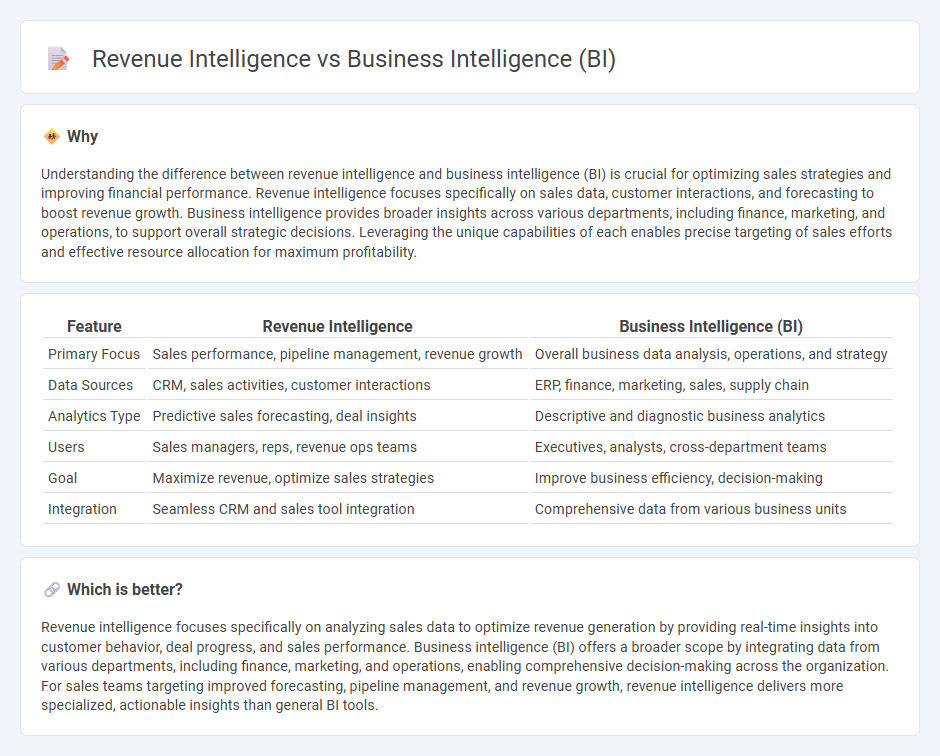
Revenue intelligence focuses on analyzing sales data to optimize revenue generation by integrating CRM insights, deal progression, and customer behavior, while business intelligence (BI) encompasses broader organizational data analysis including financial, operational, and market trends. Revenue intelligence tools enhance sales performance through real-time forecasting and pipeline management, contrasting with BI platforms that support strategic decision-making across multiple departments. Explore how leveraging both revenue intelligence and BI can drive superior business outcomes and accelerate growth.
Why it is important
Understanding the difference between revenue intelligence and business intelligence (BI) is crucial for optimizing sales strategies and improving financial performance. Revenue intelligence focuses specifically on sales data, customer interactions, and forecasting to boost revenue growth. Business intelligence provides broader insights across various departments, including finance, marketing, and operations, to support overall strategic decisions. Leveraging the unique capabilities of each enables precise targeting of sales efforts and effective resource allocation for maximum profitability.
Comparison Table
| Feature | Revenue Intelligence | Business Intelligence (BI) |
|---|---|---|
| Primary Focus | Sales performance, pipeline management, revenue growth | Overall business data analysis, operations, and strategy |
| Data Sources | CRM, sales activities, customer interactions | ERP, finance, marketing, sales, supply chain |
| Analytics Type | Predictive sales forecasting, deal insights | Descriptive and diagnostic business analytics |
| Users | Sales managers, reps, revenue ops teams | Executives, analysts, cross-department teams |
| Goal | Maximize revenue, optimize sales strategies | Improve business efficiency, decision-making |
| Integration | Seamless CRM and sales tool integration | Comprehensive data from various business units |
Which is better?
Revenue intelligence focuses specifically on analyzing sales data to optimize revenue generation by providing real-time insights into customer behavior, deal progress, and sales performance. Business intelligence (BI) offers a broader scope by integrating data from various departments, including finance, marketing, and operations, enabling comprehensive decision-making across the organization. For sales teams targeting improved forecasting, pipeline management, and revenue growth, revenue intelligence delivers more specialized, actionable insights than general BI tools.
Connection
Revenue intelligence integrates data from sales activities and customer interactions to provide actionable insights, while business intelligence (BI) aggregates and analyzes broader organizational data including market trends and financial metrics. Together, they enable sales teams to identify revenue-driving opportunities and optimize forecasting accuracy by combining micro-level sales data with macro-level business performance indicators. This connection fosters data-driven decision-making that enhances sales strategies and accelerates revenue growth.
Key Terms
Data Analytics
Business intelligence (BI) primarily focuses on analyzing historical data from various business operations to provide actionable insights for strategic decision-making, leveraging tools like data warehouses and dashboards. Revenue intelligence emphasizes real-time analysis of sales and customer data to optimize revenue generation and improve sales performance through predictive analytics and CRM integration. Explore our detailed comparison to understand how these analytics approaches can transform your business outcomes.
Pipeline Forecasting
Business intelligence (BI) primarily gathers and analyzes historical sales data to generate pipeline forecasts, providing a comprehensive overview of past performance and trends. Revenue intelligence enhances pipeline forecasting by integrating real-time sales interactions, customer signals, and predictive analytics to deliver actionable insights and improve forecast accuracy. Explore how leveraging revenue intelligence can transform your pipeline forecasting strategies for better revenue outcomes.
Deal Insights
Business intelligence (BI) aggregates and analyzes organizational data to optimize overall performance, while revenue intelligence zeroes in on pipeline and sales metrics to boost deal success rates. Deal insights in revenue intelligence provide granular analysis of buyer behaviors, sales rep actions, and competitive dynamics within specific transactions. Explore how leveraging deal insights can sharpen sales strategies and maximize revenue growth.
Source and External Links
Business intelligence - Business intelligence (BI) consists of strategies, methodologies, and technologies used by enterprises for data analysis and management of business information to support a wide range of business decisions and create strategic opportunities.
What Is Business Intelligence (BI)? - Business intelligence is a set of technological processes for collecting, managing, and analyzing organizational data to yield insights that inform business strategies and operations, enabling better and data-driven decision-making.
What is Business Intelligence (BI)? A Detailed Guide - Business intelligence is a technology-driven data analysis process that helps organizations make informed business decisions by preparing, querying, and analyzing data using tools for reporting, visualization, and analytics.
 dowidth.com
dowidth.com